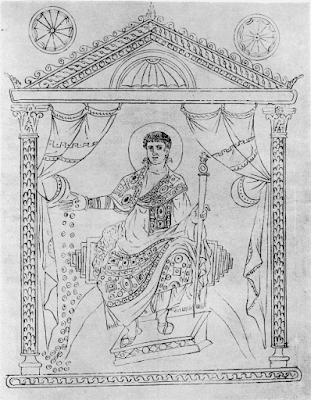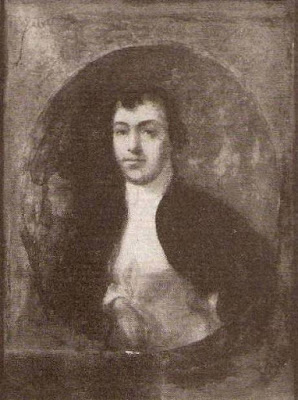I failed to mark James Madison's birthday yesterday, but not to worry: over at Millard Fillmore's Bathtub, Ed Darrell noted the occasion with a lengthy post replete with links: March 16, Freedoms Day - How to Celebrate James Madison?
By way of belated celebration, let me one last link. Harriet Martineau, a Briton touring the United States, arrived at Montpelier on February 18, 1835, remaining several days. Several years later, she published a two-volume work describing her travels, Retrospect of Western Travel. Her description of the now elderly Madison, 83 years of age at the time of her visit, which appears in the first volume, is probably my favorite portrait of the former president. I have added some paragraph breaks:
It was a sweet day of early spring. The patches of snow that were left under the fences and on the rising grounds were melting fast. The road was one continued slough up to the very portico of the house. The dwelling stands on a gentle eminence, and is neat and even handsome in its exterior, with a flight of steps leading up to the portico. A lawn and wood, which must be pleasant in summer, stretch behind; and from the front there is a noble object on the horizon, the mountain-chain which traverses the state, and makes it eminent for its scenery. The shifting lights upon these blue mountains were a delightful refreshment to the eye after so many weeks of city life as we had passed.
We were warmly welcomed by Mrs. Madison and a niece, a young lady who was on a visit to her; and when I left my room I was conducted to the apartment of Mr. Madison. He had, the preceding season, suffered so severely from rheumatism, that, during this winter, he confined himself to one room, rising after breakfast, before nine o'clock, and sitting in his easy-chair till ten at night.
He appeared perfectly well during my visit, and was a wonderful man of eighty-three. He complained of one ear being deaf, and that his sight, which had never been perfect, prevented his reading much, so that his studies "lay in a nutshell;" but he could hear Mrs. Madison read, and I did not perceive that he lost any part of the conversation. He was in his chair, with a pillow behind him, when I first saw him; his little person wrapped in a black silk gown; a warm gray and white cap upon his head, which his lady took care should always sit becomingly; and gray worsted gloves, his hands having been rheumatic. His voice was clear and strong, and his manner of speaking particularly lively, often playful. Except that the face was smaller, and, of course, older, the likeness to the common engraving of him was perfect. He seemed not to have lost any teeth, and the form of the face was therefore preserved, without any striking marks of age. It was an uncommonly pleasant countenance.
His relish for conversation could never have been keener. I was in perpetual fear of his being exhausted; and at the end of every few hours I left my seat by the arm of his chair, and went to the sofa by Mrs. Madison on the other side of the room; but he was sure to follow and sit down between us; so that, when I found the only effect of my moving was to deprive him of the comfort of his chair, I returned to my station, and never left it but for food and sleep, glad enough to make the most of my means of intercourse with one whose political philosophy I deeply venerated.
There is no need to add another to the many eulogies of Madison; I will only mention that the finest of his characteristics appeared to me to be his inexhaustible faith; faith that a well-founded commonwealth may, as our motto declares, be immortal; not only because the people, its constituency, never die, but because the principles of justice in which such a commonwealth originates never die out of the people's heart and mind.
This faith shone brightly through the whole of Mr. Madison's conversation except on one subject. With regard to slavery he owned himself almost to be in despair. He had been quite so till the institution of the Colonization Society. How such a mind as his could derive any alleviation to its anxiety from that source is surprising. I think it must have been from his overflowing faith; for the facts were before him that in eighteen years the Colonization Society had removed only between two and three thousand persons, while the annual increase of the slave population in the United States was upward of sixty thousand.
For a fine book on the older Madison and his legacy, I highly recommend Drew R. McCoy's evocative and thoughtful The Last of the Fathers: James Madison & The Republican Legacy.





































